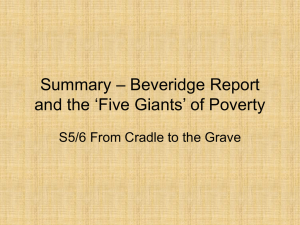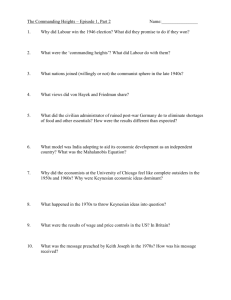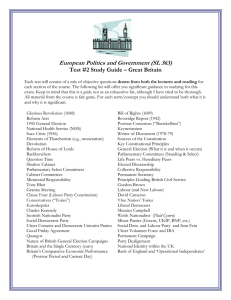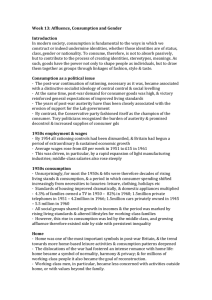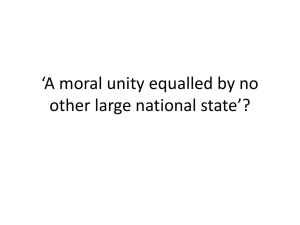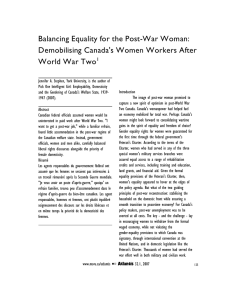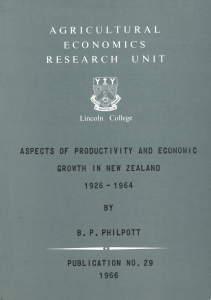The People’s War The Second World War and British National Identity
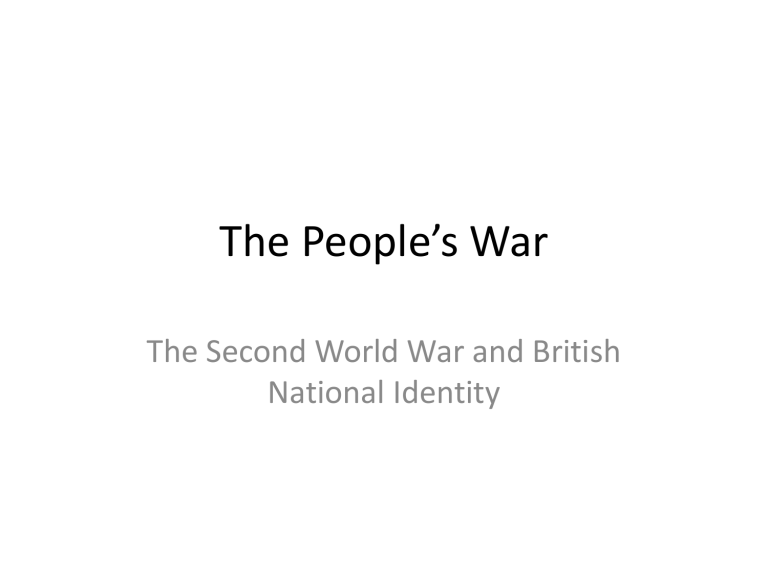
The People’s War
The Second World War and British
National Identity
The story of a people’s war
• The Second World War seen as a highpoint for social/national solidarity
• Victory/resilience in war in part a product of this national spirit
• Turns Britain from liberal democracy to social democracy, cemented in post-war social democratic welfare state settlement
• The idea of a ‘people’s war’ in turn key in maintaining a post-war political consensus over this settlement, and in the power of a British identity (against internal nationalism and European integration)
THE CASE FOR A ‘PEOPLE’S WAR’
A war of national survival
• Britain faces real threat of invasion/defeat
(1940 German invasion of France; British evacuation at Dunkirk;
Luftwaffe attack in
Battle of Britain – 2m houses destroyed;
43,000 civilian deaths in
Blitz
Mobilisation of whole population
• State takes over management of economy and supply of labour
• No waiting for conscription:
National Service Act makes men
18-41 eligible for military service
• By 1942 men and women 18-60 to make themselves available for some kind of service
• Women 19-24 conscripted into services
• Women in paid employment rises from 4.9m to 6.7m
• Essential work orders cover
8.75m
• Billeting, Rationing, Price Control, and Blackouts extend state power
War-borne national unity
• Blitz spirit/stoicism – no mass breakdown of morale
• Evacuation leads to cross-class and countryside-town encounters and sympathy
• Queues to buy copies of Beveridge Report
• Birth of Common Wealth party; by-election success 1943
• Paul Addison: The Road to 1945
• Attack on ‘snooping’: British way in propaganda – truth telling?
• Radio of rhetoric of a ‘people’s war’ eg J.B.
Priestley’s ‘Postscripts’ on Sunday evenings: http://www.bbc.co.uk/archive/dunkirk/1431
0.shtml
• Labour landslide 1945: 47.8% vote vs
Conservative’s 39.8%
Contrast to WWI/interwar
• ‘I will tell you what we did for
[servicemen] and their young wives at the end of the last war.
We did nothing …’ (J.B. Priestley,
‘Postscript’, 28 July 1940)
• Contrast to unemployment and social division of interwar years.
• Contrast of war of right extended from international struggle to home front (Beveridge: ‘no doubt of the determination of the
British people, however hard pressed in war, not to live wholly for the war, not to abandon care of what may come after’ (William
Beveridge, Social Insurance and
Allied Services, 1942)
Post-War Memory
• Heroic vision of war (military) makes way for people’s history. Both offer vision of the good war
( http://www.youtube.com/watch?v=_qVvpK kYchw )
• Trauma of war brushed aside.
• Subject for post-war film, television, comics, popular history, and memorialisation. 80-100
WWII films 1945-63; 30 top box-office
• War emerges as moment of appealing moment of national solidarity and certainty in context of social division and decline, and one that left and right can both see as positive.
• British-centred people’s war a product also of loss of Empire/turn inwards/and antiimmigrant identity to follow (Chris Waters,
‘Dark Strangers’)
PROBLEMS WITH ‘PEOPLE’S WAR’
Which People’s War?
• Sonya Rose: class/gender/ethnic divisions
• James Hinton: Shop Floor
Citizens and Women and
Social Leadership – persistence of class divisions
• Evacuation as a story of class tension, social disgust, and damage
(John Macnicol)
The underbelly of war
• Rationing/hardship not the same for all
• Thriving black market: culture of spivs (Mark
Roadhouse). Crime up
57%
• Post-war opposition to continuation of controls and austerity; power of language of individual freedoms (election of
Conservatives 1951-64)
A People’s Victory?
• Was the election of Labour in 1945 a reflection of a people’s victory, or was it inevitable after the turn against the Conservatives and the policy of appeasement after 1940?
• Were people voting for a welfare state of just houses and jobs? Feb
1945: 54% housing most urgent; 13% employment
• Labour ‘landslide’ in seats but over half of vote vs Labour.
• ‘Gestapo’ rhetoric of Churchill indicates hostility of much of population to socialism
• ‘Apathy school’ question whether this was vote vs Conservatives rather than vote for Labour/socialism
• McKibbin: limits to social democracy
Cold War Culture?
• Lack of attention in Britain to the culture of living in an era of cold war
• 1947-60 National Service
• 1950- Korean War
• Matthew Grant: nuclear deterrence and civil defence:
Grant, M. (2010) ''Civil defence gives meaning to your leisure':
Citizenship, participation, and cultural change in Cold War recruitment propaganda, 1949-
54', Twentieth Century British
History, 22 (1), pp.52-78.
• Relationship to People’s War?
David Edgerton: the warfare state
